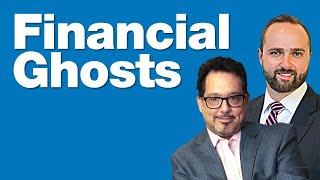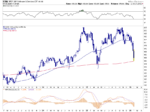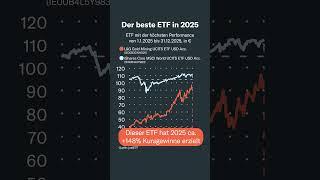Tag Archive: newsletter
ERZÄHLE ICH NUR VON HIRNGESPINSTEN?
Klicke hier, um Dich gemeinsam mit Oli unabhängig zu machen:
? http://bit.ly/oli-ausbildung
Meine Webseite: https://tradingcoacholi.com/
►Mein Telegram Kanal: http://t.me/tradingcoacholi
►Folge Oliver auf Facebook: http://bit.ly/TOFBpage
►Folge Oliver auf Instagram: http://bit.ly/TOInst
►Oli macht auch TikToks: https://www.tiktok.com/@tradingcoacholi
►Abonniere Oliver auf YouTube: http://bit.ly/Oli-Kanal
DIE TRADING COMMUNITY VON OLIVER KLEMM...
Read More »
Read More »
WION Fineprint | Russian Space Agency: Soyuz MS-22 radiator hit by micro meteoroid
Russia's Soyuz spacecraft MS-22 suffered a three hour long coolant leakage episode on Wednesday night. The untimely leakage forced the Russian space agency to call off its planned six hour long spacewalk of its two astronauts.
Read More »
Read More »
Ukraine-Russia War: Ukraine works to restore power after Russian missiles batter grid | Latest |WION
We are close to the end of the year but it has been 10 long months since Russia invaded Ukraine. Even after witnessing defeat in three Ukrainian cities, Russian President Vladimir Putin is not ready to back down.
Read More »
Read More »
FIAT Currency System In Mortal Danger
In this latest interview, Darryl and Brian Panes from As Good As Gold Australia interview Advisor to AGAGA, Alasdair Macleod.
Read More »
Read More »
Optionshandel – die Grundlagen (+ Geschenk)
Dich erwartet eine komplette Schulung in der "Geheimwaffe der Investoren" - 100% kostenfrei.
Im Kurs lernst Du, hohe Renditen mit minimalem Risiko zu kombinieren - so steigerst Du mit wenigen Handgriffen Deine Gewinne.
Read More »
Read More »
FÜR JEDEN EINEN DEUTSCHEN PASS!
Wirtschaft aktuell: Was passiert jetzt? Jetzt ein Demokonto eröffnen & in Sachwerte kaufen? Negativzinsen durch ein Online Bankkonto umgehen? Macht Forex Trading, CFD Handel und Aktien oder der sichere Hafen Girokonto und Gold Sinn?
Read More »
Read More »
Wird die Credit Suisse Gerettet? ?? #shorts
?Hol dir 100 CHF Trading Credits bei einer Aktien-Depoteröffnung ►► http://sparkojote.ch/swissquote *
(only for swiss residents)
▬▬▬▬▬▬▬▬▬▬▬▬▬▬▬▬▬▬▬▬▬
☛ Die BESTEN Gutscheine aus dem Finanzrudel ☚
Tools die ich tagtäglich nutze findet ihr hier. Mein 6-stelliges Aktien-Depot habe ich bei Swissquote und Yuh. Für meine privaten Finanzen nutze ich Zak von der Bank Cler. Meine Säule 3a für die Altersvorsorge betreibe ich bei frankly der Zürcher...
Read More »
Read More »
ANDREAS BECK (2/2): Diese Blasen werden JETZT PLATZEN… | Investieren in 2023
Wir sprachen am 7.12.22 mit Andreas über mögliche Blasen, die in 2023 platzen könnten!
Das neue Buch aus der Pennigabrik! ►► https://amzn.to/3DQ6lu ?
Gratis Finanzplan + Pennigbrie ►► https://bit.ly/pennigbrie-abonnieren
? Buch von Andreas Beck ►► https://amzn.to/3F9YlkZ ?
?So investiert Matthias ?♂️ mit seiner Pennigabrik:
• TAGESGELDKONTO (Tor 1) ►► CONSORSBANK: https://bit.ly/pennigabrik_consorsbank ?
• DEPOT (Tor 2) ►► SMARTBROKER:...
Read More »
Read More »
Wow! Schon mal drüber nachgedacht? #shorts
Gerald Hörhan ist der österreichische Selfmade Multi-Millionär mit Lederjacke und 50+ Millionen EUR Immobilienportfolio, und erklärt auf diesem Kanal, wie auch in seiner Investmentpunk Academy, finanzielle Grundlagen und komplexes Finanz-Insider-Wissen einfach, kurzweilig und verständlich.
Read More »
Read More »
Keynesian Policies Gave Us High Debt, Inflation, and Weak Growth
The evidence from the last thirty years is clear. Keynesian policies leave a massive trail of debt, weaker growth and falling real wages. Furthermore, once we look at each so-called stimulus plan, reality shows that the so-called multiplier effect of government spending is virtually nonexistent and has long-term negative implications for the health of the economy.
Read More »
Read More »
Decentralization, Freedom, and Peace Are the Pillars of a Free Society
[This article is the foreword to Breaking Away: The Case of Secession, Decentralization, and Smaller Polities, by Ryan McMaken, available in PDF, at the Mises store, and on Amazon.] Classical liberal tradition defends the right of secession on many grounds.
Read More »
Read More »
Tackling Financial Ghosts of Christmas Past
(12/16/22) The origins of Elf on a Shelf; How American's really feel about the economy, and why we're spending less this Christmas; tougher times are coming in 2023. Picking Priorities and Pet Financing; No, no, no, Janet Yellen! It's the government's fault. Austerity be damned. Opportunities for Fixed Income in 2023.
Read More »
Read More »
La fine dei templari (parte 1) Andreas Beck
1307-1314: un processo farsa condannò a morte il più potente ordine militare del medioevo. I templari erano ormai diventati uno dei più ricchi gruppi monastico-militari e il re di Francia, bisognoso delle loro ricchezze, sollevò contro di loro un castello di accuse: pratiche omosessuali, riti magici di iniziazione, blasfemia.
Read More »
Read More »
Investors Brace for the Fed’s Hard Landing
As investors hope for a Santa Claus rally in the days ahead, the Grinch is looking to steal their holiday cheer. Federal Reserve chairman Jerome Powell announced another interest rate hike on Wednesday – this time by half a percentage point.
Read More »
Read More »
























































